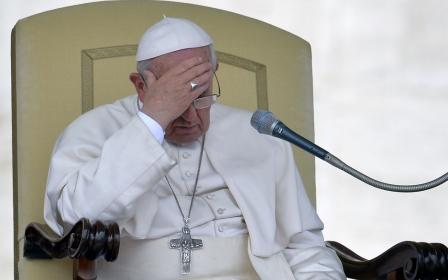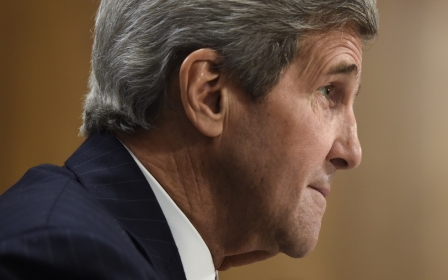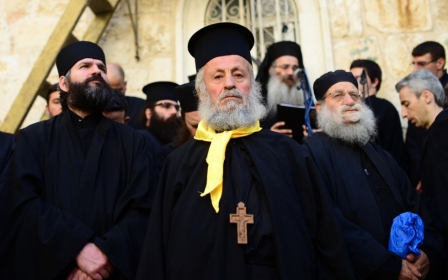Political tensions rise over pope's Holy Land visit

A tour by Pope Francis of Israel and the occupied territories - the Holy Land from which Christianity originated - appears set to be marred with political issues amid threats by Jewish ultra-nationalists to disrupt the visit.
The Argentine Pope plans to visit the Holy Land on Sunday, 25 May, after beginning a “pilgrimage of prayer” - a tour of the Middle East - in Jordan on Saturday.
With an eye towards promoting reconciliation and unification between restive religious groups, he is travelling with Rabbi Abraham Skorka and Omar Abboud, a leader of Argentina’s Islamic community - two friends from his time as archbishop of Buenos Ares.
In Bethlehem, the pope will meet Palestinian Authority President Mahmoud Abbas and then celebrate mass in front of the Church of the Nativity - the traditional birthplace of Jesus - before visiting a nearby refugee camp.
After a short flight to Tel Aviv's Ben Gurion airport, he will be greeted by Israeli President Shimon Peres and Prime Minister Benjamin Netanyahu. He will hold a top-level meeting with Orthodox Church leaders before spending the night in the residence of the papal nuncio in annexed east Jerusalem.
New MEE newsletter: Jerusalem Dispatch
Sign up to get the latest insights and analysis on Israel-Palestine, alongside Turkey Unpacked and other MEE newsletters
Israel seized east Jerusalem in 1967 and calls the entire city its "united, undivided capital", in a move never recognised by the international community.
It is there that he will spend much of 26 May, apart from brief forays into Israel to pay his respects at the Yad Vashem Holocaust memorial and to visit Peres and Israel's two chief rabbis.
Extremist threats
Jewish ultra-nationalists have threatened violence over the Pope’s visit, angered at, among other things, his stated aim to hold a mass in the Upper Room or Cenacle, on Mount Zion near the walls of the Old City, said to be the location of the biblical "Last Supper".
The site is claimed by Jews as the burial place of King David, and is one many contested by various religious groups in the region.
Graffiti has been found scrawled in various scared locations in anticipation of the Pope’s visit, threatening to disrupt the event. One reportedly read “price tag: killing the pope.”
Police Commissioner Yohanan Danino, the highest police authority in Israel, promised to take measures to combat threats from extremists.
"There have been attempts here - principally as we get closer to the visit itself - by some extremists to try and make a provocation, and create a bad atmosphere before the visit," he told reporters in Jerusalem.
"We have absolutely no intention of tolerating this.”
Papal Nuncio Archbishop Giuseppe Lazzarotto warned against taking the extremists’ threats too seriously.
"We know that this happens but we should not over-estimate them, or give them more importance than they have, because we know that the majority of the Israeli people are happy that the Holy Father is coming," he told reporters.
"He doesn't want to use an armoured car, do you know why? Because he says that it would be a very bad message for the people: 'I need an armoured car because I am afraid of you.'
"The pope is not afraid of anyone.”
Prioritising Palestine
The Pope’s decision to begin his visit in the West Bank rather than Israel has been noted as significant by some observers.
Ziyyad Bandak, Abbas's advisor for Christian affairs, told Voice of Palestine radio that Israel was reportedly unhappy that "the pope will begin his visit in Palestine and not Israel".
The Pope’s visit would be a boost for the cause of Palestinian liberation. "He will have a lunch with Palestinians, with families suffering from the occupation... then he will visit Dheishe refugee camp to witness the suffering of Palestinian refugees.”
"We welcome this visit and consider it as support for the Palestinian people, and confirmation from the Vatican of the need to end the occupation."
Difficult history
Relations between Israel and the Holy See have historically been frosty.
The Holy See only established full diplomatic relations with the State of Israel in 1993 and for decades had been unwilling – for both political and theological reasons – to recognise Israel.
During a visit to the region in 1964, Pope Paul VI provoked controversy by refusing to refer to “Israel” and only mentioning “the Holy Land.”
Some Jews still view the Vatican as a bastion of anti-Semitism, with centuries of hostility over Catholicism’s holding of Jews to be responsible for the death of Christ still resonating strongly.
Middle East Eye delivers independent and unrivalled coverage and analysis of the Middle East, North Africa and beyond. To learn more about republishing this content and the associated fees, please fill out this form. More about MEE can be found here.




